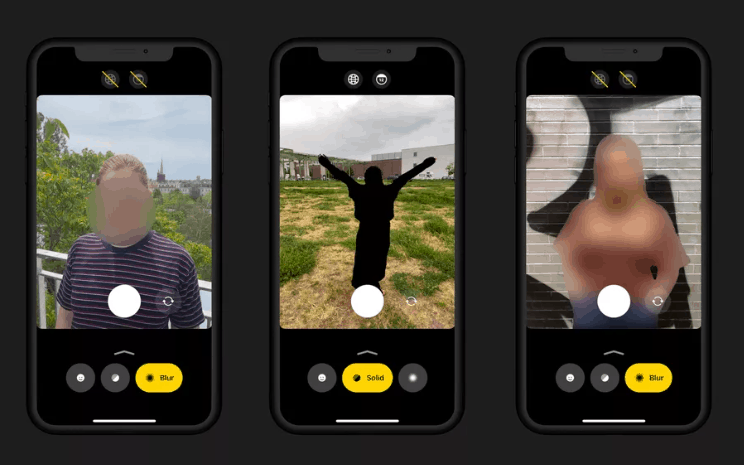Our faces have never been more vulnerable. Facial recognition algorithms make it easy to identify individuals from a single snap — a fact that’s particularly relevant at a time of protest. But with the help of advances in machine learning, it’s also easier than ever to anonymize photos and videos, removing information that would otherwise identify people.
The latest example of this is a new camera app called Anonymous Camera, that launches on the iOS App Store today. It’s the work of London AI startup Playground, whose founders built the app with the help of investigative journalists who wanted an easy way to record anonymous footage. Although it’s no silver bullet for privacy, Anonymous Camera offers the most comprehensive and easy-to-use features we’ve seen in an app of its kind.
Anonymous Camera uses machine learning to identify people in images and videos and then blur, pixelate, or block out entirely faces or whole bodies. Being able to block out feature altogether is important, as some blurring and pixelation methods can be reversed, and individuals can often be identified not just by their faces but by their clothing, tattoos, and other identifying markers.
The app can also distort voices in videos and strips any metadata that’s automatically embedded in files by cameras and phones. That includes the time a photo or video was taken and, depending on your privacy settings, where it was taken. Even if you anonymize individuals in photos, this information can reveal a lot, whether it’s shared accidentally online or retrieved later when a device is analyzed.
Perhaps most importantly, Anonymous Camera processes content in real time on users’ devices, something that wasn’t possible before recent advances in AI. This means videos or photos only exist in their original state for a brief time as the app amends them. So, if someone’s phone is confiscated at a later date, no uncensored files will be available.
We’ve been testing Anonymous Camera in London, including at a recent Black Lives Matter protest. It’s definitely not a perfect tool for anonymizing crowd shots in protests (something its creators say it wasn’t originally intended for) but it does make anonymizing close-up photos and videos of individuals and small groups extremely simple.
Gabriel Mitchel and Aaron Abentheuer, co-founders of Playground, told The Verge they were inspired to create Anonymous Camera after reading reports of journalists in the United Arab Emirates who were writing about the persecution of LGBT groups.
“It’s very important that whenever you take a photo of someone [in the UAE] you have to be very careful to anonymize that immediately,” said Abentheuer. “People capture footage and then anonymize it through Photoshop, but in the meantime the government might have confiscated their camera, and with that the compromising material.” Anonymous Camera removes the need for this entire post-production process.
Ah early user of the app who testified to its usefulness is Paul Radu, an investigative journalist who covers organized crime and corruption with the OCCRP, which helped publish the Panama Papers. Radu told The Verge he’s already used Anonymous Camera in his reporting, using it to record videos with interview subjects anonymously.
“The app builds an almost instant layer of trust and safety that is very important,” Radu told The Verge. He said he showed interviewees how the app obscured their features in real-time, which reassured them no uncensored video was being captured. This built “an almost instant layer of trust and safety,” says Radu. “It’s easy to explain to the interviewee and easy to show.” A splitscreen feature also lets interviewers show their face while recording video.
One journalist who offered Playground advice on building the app is Paul Cheung, a director at the journalism nonprofit the Knight Foundation. Cheung told The Verge over email that he didn’t expect AC to be “the next Instagram,” but thought it could be useful for a lot of people, including journalists, activists, and citizens documenting certain subjects. “The tool can be used for sensitive stories involving victims of sexual abuse or violence, undocumented immigrants or protesters,” said Cheung.
But how useful is the app for protests? When Mitchell and Abentheuer began working on the app last year, the Hong Kong democracy protests had begun in earnest, and masked protesting was becoming the norm. This inspired their work, and they managed to get a number of protesters to test the app. They found it had its uses, but also its limitations.

